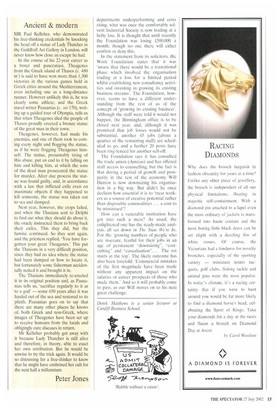Ancient & modern
MR Paul Kelleher, who demonstrated his free-thinking credentials by knocking the head off a statue of Lady Thatcher in the Guildhall Art Gallery in London, will never know how close an escape he had.
In the course of his 22-year career as a boxer and pancratiast, Theagenes from the Greek island of Thasos (c. 480 K.) is said to have won more than 1,300 victories in the various games held in Greek cities around the Mediterranean, even including one as a long-distance runner. However unlikely this is, he was clearly some athlete; and the Greek travel writer Pausanias (e. AD 170), writing up a guided tour of Olympia, tells us that when Theagenes died the people of Thasos proudly erected a bronze statue of the great man in their town.
Theagenes, however, had made his enemies, and one of them took to coming every night and flogging the statue, as if he were flogging Theagenes himself. The statue, presumably tiring of this abuse, put an end to it by falling on him and killing him, at which the sons of the dead man prosecuted the statue for murder. After due process the statue was found guilty, and, in accordance with a law that inflicted exile even on inanimate objects if they happened to kill someone, the statue was taken out to sea and dumped.
Next year, however, the crops failed, and when the Thasians sent to Delphi to find out what they should do about it, the oracle instructed them to bring back their exiles. This they did, but the famine continued. So they sent again, and the priestess replied, 'You have forgotten your great Theagenes.' This put the Thasians in a very difficult position, since they had no idea where the statue had been dumped or how to locate it, but fortunately some fisherman accidentally netted it and brought it in.
The Thasians immediately re-erected it in its original position and, as Pausanias tells us, 'sacrifice regularly to it as to a god' — some 650 years after it was hauled out of the sea and restored to its plinth. Pausanias goes on to say that there are many other places he knows of, both Greek and non-Greek, where images of Theagenes have been set up to receive honours from the locals and obligingly cure diseases in return.
Mr Kelleher probably got away with it because Lady Thatcher is still alive and therefore, in theory, able to exact her own retribution. But he would be unwise to try the trick again. It would be so distressing for a free-thinker to know that he might have enshrined her cult for the next half a millennium.
Peter Jones
































































 Previous page
Previous page